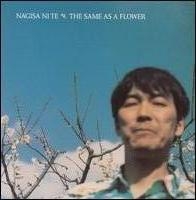
The duo of Shinji Shibayama and partner Masako Takeda, plus a few friends, has crafted some of the most moving, timeless folk pop of the last decade. Albums like On the Love Beach, The New World and Feel all do more than just capture the musical possibilities of great songs and moving performances. They serve as templates for a deeply felt, spiritual existence. The beauty observed from this vantage point embodies transcendentalism in its purest state, with their lush pop majesty serving as a most serene, mind cleansing lookout.
It's tempting to see this dreamlike, atmospheric pop haze as inaccessble and distanced, but that's probably the most common mistake in approaching the music of Nagisa Ni Te. It's barely abstracted at all. On the contrary, their images are some of the most resolute, concrete descriptions of love and life I've come across. Their performance merges a traditional, and quite approachable, pop base with subtle, impressionist studio trickery that is often so quietly disarming that new layers of understanding wait to be further revealed on 4th, 5th and more listenings. And did I mention they use a mellotron tastefully? Who does that today? This is music made with the same attention to detail and texture as a film by someone like Tarkovsky or Zhang Yimou (pre Hero, which I LOVED btw). Like P-Vine labelmates, Low, Shinji and Masako bid the listener to approach music, and the world, from a more intuitive place, where words like "skill" and "competition" have little to no meaning, mastery is a state of mind, and grace is as simple as a flower, which I suppose would make this album The Same as a Flower (Jagjaguwar).
No comments:
Post a Comment